Ten years ago, Jorge Mario Bergoglio became Pope Francis and henceforth one of the most important and respected people in the world, not only due to his post but also his daily message transmitted from Saint Peter’s Square.
An official explanation of who Bergoglio is runs: his name was chosen in tribute to Saint Francis of Assisi, he is the 266th Pope of the Catholic Church and the eighth sovereign head of State of Vatican City, the first Jesuit Pope, the first from the Southern Hemisphere and the Americas and the first non-European since the Syrian Gregory III who died in 741 AD.
A description of his qualities highlights: "He is known for his humility, his preference for the poor and his commitment to dialogue with persons of different origins and creeds. His simplicity became evident when he opted to live in Saint Martha’s House instead of the palatial papal residence within the Vatican Apostolic Palace used by his predecessors since 1903."
To mark a decade of his papacy, Francis received Perfil in the Vatican for an interview of both great length and depth. He did not dodge any question – ranging from Argentine politics to his visit to this country, from the problems of the Church to what he could and could not do, from Catholic dogmas to feminism, from economics to social needs.
A historic interview for a historic personality.
METAPHYSICS
When you experienced the unique event of a Pope participating in the funeral of a pope emeritus, as in the recent case of Benedict XVI, did that make you reflect longer and deeper on the finity [of life] and death?
That’s something that I wouldn’t say I do habitually but sometimes I drift there, saying to myself: "You don’t have much time left." You make the most of what you have to do now because reaching my age in good health is a grace but I don’t know how long it will last. I return to those thoughts now and again in great peace. It also helps not to hold that thought because some people take for granted the past, present and future through to the year 2050. But no, it’s a temptation to think that tomorrow I might have to leave all this and pass over to the other side, that’s the law of life. But one must remember that and it does you good.
And did the funeral remind you of that?
Not just then but afterwards. I thought about it when I went to see him two days before his death when the poor man’s health was already collapsing. Then I thought: "[His life] is ending," adding to myself: "Your turn will come."
Science has the Big Bang as marking the beginning of time and space in the universe, whereas The Bible states that it was God who created the universe. What is your own interpretation of the beginning of time?
The main thing here is that there was a beginning, that’s the key thing. ‘The Book of Genesis’ was not the first written in The Bible. Beforehand came 'Exodus' or the experience of the liberation of Israel. Afterwards they looked back and asked themselves how things started. Using a word which I hope is correctly interpreted, it is a mythical language yet not in the sense of “superstitious” but of myths based on knowledge because myths are also a form of knowledge. The interesting thing about Biblical language is not that it began just like that but that there was pause and development within creation, like an anachronistic memory which returns. When God created, he did not create everything perfect, he created as a process and that’s what The Bible tells us. Those seven days symbolise a process of centuries reread via the history of Israel since the 'Exodus.' And it is a rereading which saves humanity from the chaos of the cosmos.
LINES WITHIN THE CHURCH
Why do some of the reforms you propose seem to find more acceptance outside the Catholic Church than within some of its own sectors?
I like you saying "seem to" because sometimes it’s that way and others not. It’s relative and, as we porteños say, nobody likes having their heels kicked. So when you have to carry out a reform which implies discipline, the applause comes from outside and not the receiving-end. The day they do it to you, you won’t like it so much. From outside the steps to be taken look better while those who suffer them complain. It’s happened to us all. When setting limits or changing course, it’s an issue of domestic and social discipline. It’s true, sometimes people say what needs to be done and those who suffer it speak of injustice and make a fuss but the right to make a fuss exists within the Church and must be respected.
Do you have any use for the opinion of those who consider that since the Church is not a worldly institution, it should not be updated to modern times?
That’s an orbital idea in orbit.
Does time stop?
It does for the indietrists always looking back. When somebody tells me: "This is traditionalist," it could be on the right lines because tradition always moves ahead. Tradition is like the root of the tree and then afterwards the sap of the tree makes it grow ever upwards. Tradition is healthy because it has this dynamism. The problem is taking a step back because it was always done that way before and there are people who take a step back. There is a phrase in [Saint Paul’s] letter to the Hebrews which has always caught my attention, which partly refers to this when it says: "We are not people going back but forward." The problem is not tradition, which is always a source of inspiration, the problem is what I call ‘indietrism,’ being stuck in the past century 20 or more years ago.
Is trying to make time stop a form of totalitarianism?
I like your way of summing it up, that’s fine.
For some people you are too conservative while for others you are too progressive. To what do you attribute this dualism in the views of you?
If you look through this camera from one angle, things will look horizontal and big and if you look from another, vertical and small. From your standpoint to observe things, from your inner attitude, philosophy and convictions is how you will see reality and judge it.
Would that mean that you are in the correct place: the Greek idea that the truth is equidistant from the extremes?
Partly yes and partly no, the truth is always dynamic, always in tension, I would say. If we say that one is balanced between one side and the other, you remain static when the manifestations of the truth are always growing. For example, human understanding is different from what it was four centuries ago because reality manifests itself better.
Regarding subjectivity, about which you were talking, we all see from one standpoint and a certain perspective while only God can see from every perspective.
Because God is beyond place.
We might ask this of the Holy Father that he see everything from every standpoint. Passing to something more worldly, 132 Cardinals aged under 80 have the right to elect your successor, of whom 83 were named by you, 38 by Benedict XVI and 11 by John Paul II, i.e. three-quarters of the total were chosen by you. Is there a more progressive orientation in those choices which would permit us to imagine a more modernised Church in the future?
When you name a cardinal, you are balancing his role and work in today’s Church a bit. You see a man who has received from tradition but who is taking the steps which need to be taken in today’s world and that already means a certain attitude. If one thinks of a man who is detached from space and time and a bit behind the times, why choose the poor man to suffer and not do his best? Again, the temptation of indietrism. One chooses the people who are in tune with today’s world after much prayer, thought and consultation because selecting cardinals is not easy. And it’s often happened to me that at the last minute I’ve had to erase one list and put other names because the tension lasts until the last lap, provoked by the consultations made. But we cannot see that it is either here or there because I don’t know what will be the inspiration of the Holy Spirit afterwards.
You were ordained a priest in 1969 after the conclusion of the Second Vatican Council. Are you the first Pope to be purely the product of that Vatican Council, stripped of any prior influences?
In part yes, in part no. I studied theology and, of course, philosophy according to the old school. When I was studying theology, the Council had recently started and some professors were introducing some innovations but it was the old school. It was only very advanced in the Holy Scriptures because that leads to another kind of thinking and research and I had some excellent professors like [Severino] Croatto, for example. Only there would I say that I had a very up-to-date training in Holy Scriptures and I had to catch up with the rest later. In Morality, for example, I had the most traditional and narrow-minded training there was in those times and I had to reassemble Morality afterwards on my own account.
Was the perspective before and after the Second Vatican Council very different from the viewpoint of aspects like morality?
I congratulate you for your question, you speak of 'perspective' and that is indeed different.
THEOLOGY
How did you arrive at the conclusion that the Church must display greater understanding towards the divorced?
Jesus beat me to it. My attention was caught by that parable so characteristic of him when those fussy people were dodging the invitation to the banquet and Jesus, transforming his mood into the wrath of God, saying: “Go to the crossroads and bring them all into me, the healthy and the sick, the righteous and the sinners, big and small, old and young, everybody.” The call of Jesus is for everybody – the Church is universal in that aspect. And nobody can say: "They’re sinners and I’m not."
When we were kids, the custom among the most Catholic families was not to go to the houses of divorced people because that gave the impression of having already taken one step into Hell. That is not a Christian concept, it’s really political, segregationist, etc. Jesus tells us today: 'everybody', and each person in the Church, aided by the community or by the pastor or whoever, should review and analyse their situation, placing themselves before God. Nowadays it is the right of Christians and a duty of the Church to accompany the new unions. Nobody can say: "You’re divorced so you’re on the list for Hell." No, they are children of God who have taken their path, I cannot judge them from outside. That’s very clear, that’s why everybody must be accompanied. And secondly, Benedict XVI, when he was prefect of the Congregation for the Doctrine of the Faith [in Alto Adige, Piedmont and Rome] said that many marriages were invalid for the Church. Why? Because when people said: "Yes, until death do us part," they never took responsibility for what that meant. So a separated and remarried person is perhaps the victim of a superficial culture and way of thinking, even within the Church. Nowadays we are insisting on religious instruction to prepare for matrimony and afterwards. When they say "until death do us part," they sometimes have no idea what “forever” means and separate within a year.
A woman once said to me: "You’re a cunning lot, you priests, you have to study six or seven years to become priests and then if you don’t like it or you meet a woman, you ask for a dispensation to leave and you can get away with it. For a lifelong commitment with no turning back, we have to settle with four premarital counselling sessions. Six years for you, four sessions for us." I believe that preparation for marriage is the key here. Nowadays when a young person says "Until death do us part," I tell them: "But do you understand what that means, do you understand that it means putting up with your mother-in-law and not just your wife, do you understand what matrimonial difficulties are and have you ever thought about them?" If they say: "Yes," well then, go ahead but in general people have no awareness of “until death do us part” and that’s the point which invalidates marriages.
How about civil union between people of the same sex?
When same-sex marriage was discussed in Argentina, the Synod argued vigorously and I, along with many other bishops, proposed that there should be the option of a civil union, not only for persons of the same sex but also to help others. We were thinking that three old-age pensioners could make a civil union of their assets for their mutual benefit with the inheritance going to one or two of them. Civil union is a much broader thing, it’s a social contract which somehow guarantees social rights and a certain stability without being the sacrament of matrimony or at least some kind of marriage. In my eyes this means the internal voting in the Synod went badly and that’s why the law [for same-sex marriage] was passed because we gave the government no alternative. I believe that civil union should exist. It’s been around in France for years and I took it from there because it is a way of giving a certain social cover to same-sex unions. Marriage is a different thing with a different setting but that’s my stance.
In a recent interview with the Associated Press news agency, you maintained that homosexuality was not a crime but it was a sin. What happens with that sin with respect to the possibility of going to Hell or Paradise?
I return to what I said about going to Hell. I’ve spoken three times about homosexuality, the first time during my flight to Rio de Janeiro, when I said: "If a person is homosexual and seeks God, who am I to judge them?" As if to say, "Enough is enough," let’s not victimise them. The second time on my trip to Ireland I told a father and mother: "Never throw a homosexual child out of your home, accept them and work them into your family." And the third time at a press conference and the Associated Press interview where I spoke of criminalisation. Unfortunately homosexuality is criminalised today in more or less 30 countries with capital punishment in almost 10 of them. That is very serious and I also said so very clearly. My stance on homosexuality is contained in those three occasions. Here [in Rome] at the general audience, persons belonging to homosexual groupings are among the other people, presenting themselves as such, and I greet everybody. They are all children of God with each one seeking God and finding Him any way they can. God only leaves aside the arrogant, all other sinners are in line.
What is your position on voluntary celibacy?
That is a possibility which exists within the Catholic Church. All the Greco-Catholics have it. Here in the Secretary of State’s department we have a father who lives with his wife and small daughter. It’s an open possibility. I don’t know if it will open up or not but it remains a possibility. There have indeed been local concessions over this issue throughout the history of the Church, not just in Eastern Europe where it is already normal, but in part here. We shall see if there will come a time when a Pope might perhaps review it. I still do not feel myself in a position to review it but it’s obviously a disciplinary matter which has nothing to do with dogma. Today it might be so and tomorrow not.
To what do you owe the preponderance of the cases of the sexual abuse of children within the Catholic Church?
There I want to be very objective. According to the percentages of the worldwide statistics of the United Nations, UNICEF, etc; between 40 and 42 percent of the abuses occur at home and in the neighbourhood where they persist in the old habits of covering up for the uncles, grandfathers and neighbours. Then come the clubs, then the schools and finally Catholic priests who account for three percent. That might not seem like much but it is because Catholic priests are proportionally fewer compared to everybody else so that three percent weighs far more heavily than the 40 percent of others. And secondly it is blasphemy. If you have a vocation to be a priest or nun, instead of helping that person to seek God, you eat them alive.
That’s an aggravating factor.
Horrible. Until the Boston scandal, these things were covered up because that was customary – also within the family things were still covered up in general. Priests were punished by changing their diocese. When the Boston scandal erupted, awareness began to grow and the Church began to say: "No, not even a single case." We are working on this continually with major denunciations. I like to listen to cases of abuse when I travel, something which started with Benedict. When I travel, I listen to the abused persons and hear horrible things, all covered up. Cruelty, destruction, it is very serious and we in the Church cannot grant ourselves the luxury of covering it up while helping to expose it within the limits of prudence elsewhere. That is the work of the Commission and all that but there is one loose point of child abuse which I’d like to underline and that is the problem of kiddie porn produced live, sometimes with very small children. I wonder what country produces that, nobody knows. What hidden pacts are there between certain authorities of this or that place and the producers of kiddie porn? That’s why I always ask the authorities to open their eyes and look around because unfortunately kiddie porn is within the reach of anybody’s mobile telephone. The damage it does is like a drug – once you develop the taste, [so hard to] get out... I know that from the cases of some addicts who were placed on trial and convicted but the hardest work was the psychiatric treatment to get them to kick the kiddie porn habit. Who produces and where and who is covering up that production are all questions which must be answered.
The Anglican Church is analysing a change in the Lord’s Prayer (“Our Father”) to remove the gender connotations, saying that God is neither man nor woman. What do you think?
We were talking a bit about that in the airplane with the Archbishop of Canterbury when returning from South Sudan and it’s a very small group within the Church of England, within a line of taking the gender out of everything – I want to be father and mother, both together. Here a very great danger of our times comes into play, which is gender ideology. Of all the ideological colonisations today, it is the worst in my judgement because it erodes the differences leading one to think there are none when it is the rich contrast of the differences which makes for progress. Gender ideology is sinister. Not the persons in any way caught up but the ideology which simplifies, unifies and removes the differences. About that I once read a novel written in 1903, The Lord of the World by [Robert Hugh] Benson, with a glimpse of the future which describes what is happening now. The novel is a bit heavy but worth reading because it makes you see with that futuristic outlook this trap of removing the differences and making everything uniform, governed by one single person, all uniform. And such uniformity is the most inhuman thing there is because if there is one thing which distinguishes us human beings, both men and women, it is creativity and liberty. I cannot imagine a dog painting a picture while I can imagine Picasso doing so because there is a creativity born of liberty which an animal does not have. Animals can learn discipline and behaviour up to a certain point, according to their teachers, but creativity is purely human so we must be very careful about removing the differences.
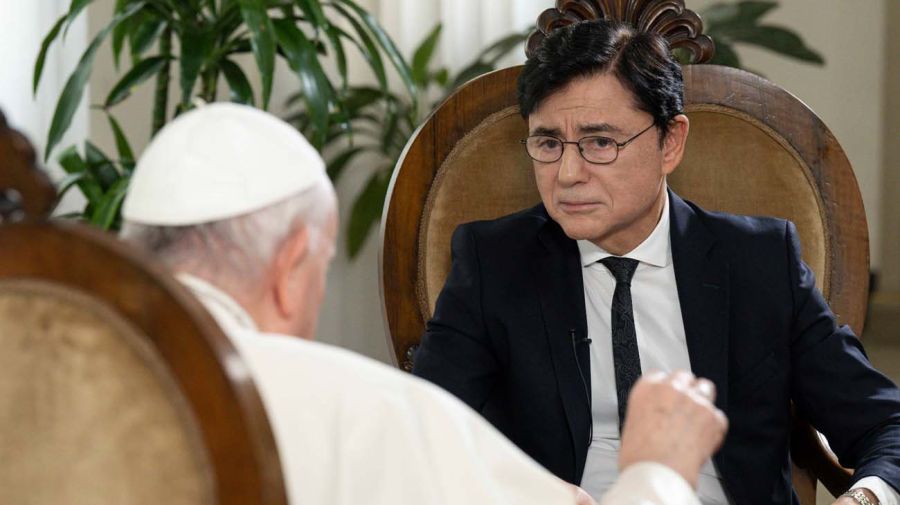
JESUITS
A historian who is not very relevant in his native Italy but is highly visible in Argentina, Loris Zanatta, finds a link between Jesuitical ideas and the experience, for example, of the Cuban Revolution and the so-called populism of Latin America. Is there any relationship between the two things?
No, I believe that to be his comparison, legitimate but reductionist because you cannot reduce [to populism] different things with different historical connotations. I would like to explain that word [“populism”] because it is used differently. In Europe, when they speak of populism, everything stands condemned because behind populism lurks [Adolf] Hitler, for example, or the populism of the leader of a religious or political movement who takes a truth or some aspiration and carries it to its final consequences. Naziism was like that. It started with a little kid called Adolfito who in a moment of crisis after the Weimar government, presented himself and pushed ahead and that’s how it all ended up. That Nazi populism believed in the idea of a pure race. Populism always reduces a people to a single idea and a dictatorship or something criminal. I like to distinguish it from “popularism,” which is the popular culture with all its richness. For example, the interesting thing about the United Nations where each people has its [cultural] wealth, we all join up seeking a harmony of this diverse wealth but if in order to enter into an institution, as does not happen in the United Nations, I have to identify with the modes of other cultures, that is not good – that is populism. In contrast, “popularism” is the personal culture of a people with its own history, culture, poetry, songs, dances, etc. all unfolding and coming together in the concert of nations. The problem of international institutions is the reductionist temptation, sometimes denying the popular or historic wealth of a people – that is populism. In contrast, “popularism” is what takes you forward. When speaking ideologically of Latin America, I would say: Let us not convert this into populism, let us respect the popular cultures of the Latin American peoples. On this subject I would like to highlight a great Argentine philosopher, [Rodolfo] Kusch – not very well known but he understood what a people is. The son of immigrants who lived in Jujuy, he is the man who best reflected on a people, the wealth of a people but he is not known – that’s curious.
PERONISM
To what do you attribute you being called the “Peronist Pope,” do you perceive yourself as being Peronist?
When they ask me that question, I will confide to you, they do so in such a tone as if to ask…
“Are you a bad person?” …
Or "You were a leper and were cured" …
That was not me saying that.
No, I already know that, but I’ll tell you about my life experience, as if to say: “Watch out!” Of my four grandparents three were Italian and one Argentine, the son of a Genovese immigrant. He worked on the Curumalal railway and was a Radical from [the first year of the party in] 1890. He was a carpenter in one of those old houses, Quintino Bocayuva 556, with a chicken hatchery and his workshop in the backyard. I can see that white-bearded man who sold aniline-dyed leather drinking tea with wine. One day my grandmother told me: "Do you know who Don Elpidio is? He was vice-president of the Republic," and they sold him the leather in 10 minutes and then spent two hours talking about politics. My grandfather was a Radical from the word go. I remember him going into the street with his top hat, gaiters and walking-stick when he went to church or a Radical meeting. His friendship with the Radicals stemmed from [1922-1928 vice-president] Elpidio González and our family always inherited his Radicalism. When the Peronist movement started, they were tremendously anti-Peronist. And in those times the movement was a bit more dictatorial, to use a word I would perhaps not like to...
More authoritarian?.
A more authoritarian Peronism which controlled La Prensa while we bought La Nación. The days went by and my father went out to buy La Vanguardia from the socialist kids selling it because it was one of the media which told things differently.
The newspaper of the Socialist Party.
I remember that 1945 rally in Plaza Francia where the range went from Regina Pacini de Alvear [widow of the Radical president Marcelo T. de Alvear] through Américo Ghioldi to the most moderate socialism. Curiously the revolutionary Marxism of Ruben Ciscaro did not attend but everybody else was there. Then aged nine, I remember it like going on a pilgrimage to Luján as something sacred. We went because democracy had to be saved, that’s the family I come from…
Could you call it anti-Peronist?
Totally, “gorila!” in the worst sense of the word, which was the sense of the right-thinking middle class in those times. I even remember from our return from Plaza Francia the chants I learned there. I remember one which I am not going to repeat because it would be in bad taste but I still remember it … My family was certainly anti-Peronist and I had to deal with all those people and change their perspective a bit. The more domestic stories told to me by Mrs Bertolini opened my eyes to the cruelty which the persecution of the Revolución Libertadora also truly was.
Why do you think they dub you Peronist? Do they do so in a pejorative sense?
I have no idea, perhaps for some of my social proposals …
IDENTITY
Why do you identify with Francis of Assisi?
It’s a spontaneous thing, seeing this son of a wealthy family leaving everything at the age of 20, even taking off all his clothes in front of his father to begin a life of impressive creativity. The life of Francis was the life of a revolutionary with the courage to turn everything upside down, recklessly going to see the Caliph or the Sultan knowing they could cut off his head. It is the impulsiveness of somebody in love with Jesus. Admirable but not lending itself to imitation. They are those saints who go marking the way and then some, afterwards you need to bring them closer to ordinary life.
Perón’s phrase was that the leader has to be a few steps ahead of his followers but not so far that they cannot see him.
I had forgotten that one, it’s true.
Why do they call you “everybody’s Pope”? Were there previously Popes who were not?
No, the Popes were always universal. I like to underline why I said at the beginning of the Gospel: "Everybody, everybody, everybody" without excluding anybody. Afterwards we can sort things out between ourselves but with everybody.
You have said that a life well lived is one which leaves a footprint. What is the footprint you would like to leave behind?
I have never asked myself that. I’m going to leave life without thinking of that. I try to be consistent, I’m a limited person with my sins, I confess my sins every fortnight. Yesterday my confessor rang me up to tell me a fortnight has already gone by, he’ll be dropping by one of these days. But I do what I think needs to be done on the day, what the cardinals asked of me in the conclave, I haven’t invented anything. Aided by the Commission of Cardinals, I set in motion what they had said before the conclave the new Pope needed to do. And that will be the footprint, a historic footprint of all that group of cardinals who dared to speak so clearly before the conclave.
What is humility for you?
I think it was Saint Theresa who defined it best – humility is truth. No self-aggrandisement, no repainting the soul, just be who you are and present yourself to God as you are, accepting all your assets, all your defeats and your limitations. Humility is the truth, when you think that you are more than you are, you are not being true to yourself, you’re fooling yourself, putting make-up on the soul.
[Synod head] Monsignor [Oscar] Ojea has related that the first meeting of all the bishops with you after your election as Pope was via videoconference when you asked the Argentine bishops to pray for you so “this does not go to my head.” And at various points of this interview you have singled out arrogance as the cardinal sin. How do you prevent this from going to your head?
It has to be by the grace of God, you have to ask for it. Arrogance does not come suddenly, it starts with vanity, which is the silliest thing, looking at yourself in the mirror. The day you smash the mirror is the day the circumstances of your life change. Arrogance is born out of vanity. And sometimes much humility to ask God to look after us and also listen to other people, accepting the criticisms. One thing I ask of the cardinals is that when they see something, they tell me and some of them do. Sometimes they are right and sometimes not but knowing how to listen helps. It helps me to come down to earth a bit. It is very easy for it to go to your head when here because who is going to tick off the Pope? I think that we must see reality and our own sins. When pride walks in the door, you have already lost.
Do you believe in destiny?
In destiny as God’s design, yes, but not as something which cannot be modified or predestined, no. Destiny is the path and vocation which God gives you while leaving you free. You can accept that call of God or not.
So free will exists.
It does, thank God.
What have the poor taught you in the course of your life?
As to where I began to feel empathy with the poor, some persons come clearly to mind, for example, the people who helped my mum around the house, simple people who had to earn the bread and dignity they had. A Sicilian widow, for example, who had come from the war with two children and began to work as a domestic help. I’ve always respected them quite naturally, I don’t know why. I still remember that Italian woman and I have a medallion which she gave me when I became Archbishop and which I still have. "Do you remember me?" and she told me something which I dare not repeat. I remember another young housemaid who came from Córdoba to Buenos Aires, Blanca she was called, and I pray for her, I don’t know how her life continued. Then there was a black woman, Manuela, who also came and helped my mother out. Those people were my first contact with poverty because I didn’t know what working was since my father worked as an accountant, and we were middle-class, with our own house, etc. But they had to struggle. The Frenchwoman, Berta, who had come from Paris after dancing there, these are stories which sunk in. I discovered poor people through our domestic help, that was my first contact, and as always, there arises that question: Why them and not me?
How does this Jorge Bergogio differ from the one who lived in Buenos Aires? What has changed for you in these last 10 years?
I wouldn’t know how to answer that today. I miss Buenos Aires very much, walking around, for example, taking the bus, the underground. I was in contact with people, it seemed the most natural thing in the world. I never used a car. Here I miss the street and I suffer the difference. I have contact with people in public audiences, and that’s where I really relive my experience with people. But I really miss the street, I had that in Buenos Aires and it gave me life.
In Buenos Aires you always had a serious face and here you smile all the time. Monsignor Ojea told me that in private you laughed a lot but in public you were somewhat shy and you’ve lost that here.
I honestly wouldn’t know how to explain that.
How did you feel when you began to see in the conclave how the votes were piling up for you to be elected Pope?
The dynamics of the conclave are a strange thing, I didn’t realise it because sometimes you don’t know who to vote for, so you cast a sort of deposit vote, until informed that there were four favourites. But then the question arises: Which of the four? So I vote for one of them. And when I saw the votes piling up in the first, second and third votes with the first in the evening and the third at noon the following day, I said: “What’s going on here, too many deposit votes?” The penny didn’t drop until after lunch when a cardinal came running up to ask me: “Is it true you’ve had a lung removed?”, and I answered: “No, just the right upper lobe due to cysts.” “When was that?” “In the year 1957.” He replied: “Oh, these last-minute tricks!” Then I realised but I still had a quiet nap before returning and I was elected in the second vote in the afternoon. Benedict was elected in the first vote of the afternoon, I in the second.
What did you feel at that moment when you were announced as Pope?
Rigidity. You defend yourself by not wanting to feel. In the penultimate vote, the first of the afternoon, when it was almost clear that it would end badly [sic], Cardinal [Claudio] Hummes came up from behind and said: “Don’t be scared, it was the work of the Holy Spirit.” A great guy, Cardinal Hummes. And when I was elected with two-thirds of the votes, Hummes came up and said to me: “Don’t forget the poor.” And that’s where the name Francis came from. Hummes was there for me with those two gestures.
How is a typical day in the life of a Pope, what time do you get up and what kind of cultural and informational content do you consume?
I go to bed at 10pm and wake up at 4am. I’m already praying around 5am and at 6am I give mass in a small chapel upstairs near my office, which you will see now. I give mass, I have breakfast and then everything starts. In the morning, nearly every day, I have an audience at the Palace. On Tuesdays I don’t have any audiences, I can work on my own, and on Wednesdays I have a general audience in the morning. In the afternoon I give audiences here, and especially I welcome the different heads of religious institutes, heads of state, secretaries for the economy, etc. In the afternoon I take some time for spiritual reading, to pray and answer letters. I like to write by hand. Dinner is at 8pm, and then I go home, read the newspaper, especially Roman ones, and at 10pm I switch off the light until the following day. That is more or less my day.
In mid-2022, owing to your problems with your knee, you referred to the possibility of some day stepping down from the Papacy. Is resignation a possibility for you?
Yes, I didn’t consider it seriously in my case because I don’t feel it that way but yes, of course. Especially now that Benedict has reopened that path after 1,000 years, it seems to be more normal.
Does Benedict reopening that path have to do with longevity, the change in lifespan?
Sure, because of the age he reached, 95.
It seems increasingly more normal for people to live for more than 90 years.
But you have to know when your strength fails you, when you start going gaga, when you forget people’s names.
They say you have a very good memory.
Yes, but I’m already losing it.
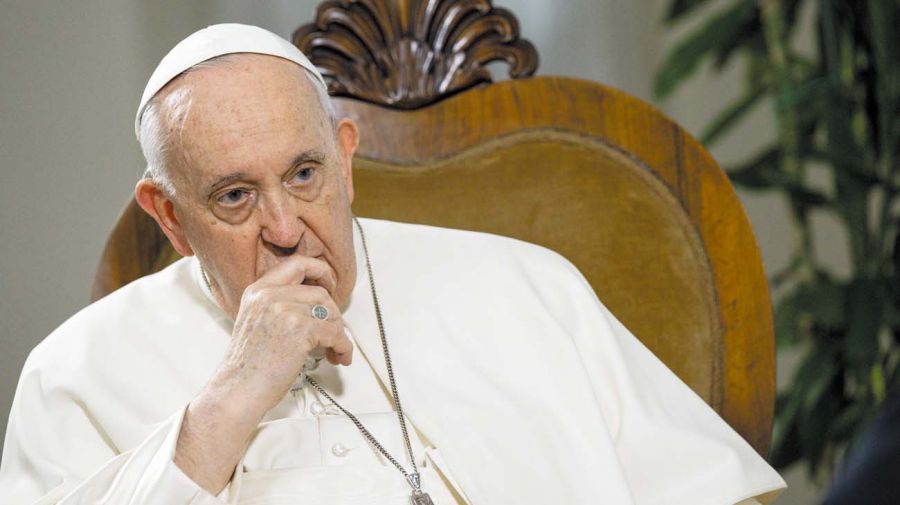
ECONOMY
Does any version of capitalism which could be aligned with the social vision of the Church exist?
The answer to your question was best defined by Saint John Paul II by adding the word “social” to the market economy. He was in agreement. Today things have gone beyond that and we can have a very good economic dialogue and achieve steps towards understanding or formulas which work well. Conversely, there is no good dialogue with the financial world. Finance is gaseous, the economy concrete. A major economist with an important role in the business world once told me: “Look, I want as an experiment to combine economics, humanism and spirituality.” We had a conference with different sessions and it turned out well, we could have dialogue and everything. Some time later I wanted to do the same thing with finance, humanism and religiosity, and it didn’t work out. The serious problem comes when economics becomes finance, which is already intangible. It is one thing to move around in the economic world and quite another to do so in the financial world, which has other rules, and we must need another set of precautions. A transaction in San Francisco, for example, has repercussions in Hong Kong tomorrow.
Is a more financial world the cause of the deterioration in the distribution of income over the last 30 years?
I wouldn’t know what to tell you. I don’t know if it is financial but there is certainly some economic factor which is resulting in increasingly more exclusion, injustice, people who die of hunger and exploitation also affecting children with child labour extremely serious.
There are voices within the Catholic flock who sustain that being liberal and being Catholic are not compatible. Given the rise of economic liberalism in Argentina in recent years and considering the number of Catholics in this country, could you express your opinion on this issue and concretely, can a person be economically liberal and Catholic or is there, as some assert, a basic contradiction?
Being liberal is a word which has developed. It was one thing when it was first used, and it is a different thing today. Liberal is a broad adjective used about a person, it is not a clear fixed term nowadays, there’s an open-mindedness to it. Today a liberal person means something else than 50 years ago. That liberalism has nothing to do with a liberal attitude today. If we use liberal with an open-minded person open to dialogue, it’s fine but if we use it in a pejorative sense..
I’m referring to the so-called libertarians, a more orthodox offshoot of neoliberalism. Can a person be Catholic and libertarian at the same time?
Yes, along the lines of the social market economy.
That goes for classical liberalism but what about libertarians?
It depends on what you understand by libertarian, it’s an ambiguous term.
Does it worry you to see the right on the rise, not only in Argentina but also in much of the world?
I worry about the exaggerated, rootless right, it’s very dangerous.
GEOPOLITICS
We have passed from a paradigm of globalisation to one of geopolitical fragmentation in which the tensions between the United States and NATO versus China and Russia have placed the world on the brink, compounded by the increased potential for a nuclear conflict. How do you read the global geopolitical panorama? Are we in a virtual Third World War?
For years I’ve been saying: “We’re experiencing World War Three bit by bit.” Syria has been at war for 13 years, Yemen for 10 years or so. The Rohingya have been struggling in Myanmar for years. Let’s not talk about Africa. Rwanda, for instance, or Goma in Northern Congo. There is war everywhere. I mean, war hasn’t stopped since the end of the Second World War. It’s a century of war, from 1914 onwards we are in a world war. I could define it as a world war in bits but we are in a world war.
With the difference that this war between Russia and Ukraine has had truly worldwide effects because those you mentioned had local effects so now we are witnessing the first local war with worldwide effects.
Yes, such global effects. The ones I mentioned before have effects relative to the armaments industry they use. And yes, it’s true and I don’t know where this is heading but the entire universe is certainly at war. We’re losing our memory.
ARGENTINA
You showed solidarity with Vice-President Cristina Fernández de Kirchner over the attempt on her life. In your encyclical you speak of dialogue between generations, young people and older people. In the case of the assassination attempt, all those arrested until now are young people disenchanted with politics, for instance, the members of the so-called Federal Revolution group, featuring very violent demonstrations against the current government. What message would you give to young people in general and to these youths in particular?
That they shouldn’t become sectarian. I don’t know this group you speak of well but when youths become sectarian, they’re stuck in a sect even if it is not called as such. And that results in the crazy things they do sometimes, as in this possible case. Please, young people shouldn’t become sectarian. And we don’t help them to have ideals. For instance, there are Catholic movements where youths are made sectarian, some new congregations founded in Argentina, which train sectarian, narrow-minded seminarians. We had to dissolve three new congregations in Argentina due to this sectarian, closed mentality, which deep down presumes to be saving the homeland.
Do you see a growth of sectarianism in the world?
Yes.
You promote dialogue between people of different origins, ideologies and creeds. would there be a possibility, due to your standing, to encourage both politicians and society in general to bridge the gap known as the grieta in Argentina, meaning the pathology of dissent and polarisation?
We are very devoted to a prefix: ‘anti’: “What is this, I don’t understand it, but I’m against it.” That is, we become anti-something quickly, and the great projects to unite Latin America, [José de] San Martín, [Simón] Bolívar, were betrayed by the ‘antis,’ causing them to fail. I was very moved by San Martín returning to a great disappointment. We have to study this historic event and see what was going on. Contradiction, while sometimes legitimate, hurts me. A country which was born somewhat federally, and has a federation because the provinces have their own constitutions and it has sometimes submitted to entirely unitarian provisions, so we didn’t quite grow as a healthy and harmonious federalism. After the Battle of Caseros (1852) the caudillo warlords ended, so anything resembling that was frowned upon. Autocratic leadership does exist, but it is subjugated nowadays and we can’t have that, there is a contradiction there. I believe we have to work up the courage to promote a healthy federalism, not only of provinces, but of municipalities within provinces. Let everyone be responsible for their own development in harmony, we’re missing that.
Is Argentina lacking more harmony than when you were ordained a priest?
It’s risky what I’m going to say but I believe so. These 50 years haven’t helped, it’s true that there was a military dictatorship, people going missing or being thrown off planes, guerrillas, everything. And that led to the lack of harmony.
When you were Archbishop of Buenos Aires, you were critical of the governments of Néstor and Cristina Kirchner, who also responded to your criticisms.
They responded in kind.
Then after several years you have managed to reconstruct a relationship with the current vice-president. How has that link evolved over the years?
It’s formal, she came here on an official basis twice. Once for my inauguration, and another time for an audience she requested, and then a third time, she was passing through and I welcomed her in this little room, but we only said hello. But she did follow me in all my visits to Latin American countries. It’s not a bad relationship, it’s polite and formal.
Was there disappointment with the current Alberto Fernández presidency for having legalised abortion or was there some prior expectation on your part that it would not be legalised?
No, I never meddled with this abortion act business, because deep down I believe there is a misconception of reality. I’m very clear about abortion, any book of embryology tells you that 30 days after conception all the organs are designed and the DNA is very clear, therefore it is a human life. So my question is: Is it fair to eliminate a life to solve a problem? Is it fair to hire a hitman to solve a problem? That’s all I have to say about abortion.
DICTATORSHIP
In the first volume of the book The Truth Shall Set You Free, published last year, there are nearly 30 pages on the Jesuits Francisco Jalics and Orlando Yorio. Argentine journalist Horacio Verbitsky criticised your behaviour towards both during the dictatorship, first in 2013 and even later when Jalics said you two had reconciled in 2018, in a letter by Yorio’s sister. How do you assess your own actions during the dictatorship?
There were different actions. In their case I said: “Be careful,” I warned them and took care of them. Sometimes everything revolves around the negotiations to free people. I met with [Admiral Emilio] Massera three times to negotiate the release of some political prisoners they held. I got along very well with General [Ricardo] Pianta, who was honest and very helpful. His superior, whose name I don’t recall, lived near the River [Plate] stadium. I even had dinner at his house one day. I knew he didn’t torture people, but he was in the same circle, and we sometimes managed to negotiate with politicians. I remember once, in San Miguel, a guy I knew was picked up. He was a friend of mine who worked at the Observatory and lived in one of the slums of San Miguel, and I went to the air base where I knew he was, to speak with the commander, and he said: “We don’t have him.” I said: “Look, I know you’re responsible.” He was a very good man, the system was the problem. “Know that there is a Hell and if you kill that boy, you’re responsible for a life and you’re heading there.” That’s what came out.
So you said: "You’ll go to Hell."
Yes, yes, just that. I used the word so that he would understand me, nothing to do with what we had been talking about previously. He came to see me at night and told me: “I found him, we’ll drop him off at this corner at 1.30 am, let his family know so that they can pick him up.” That kid now lives in Italy, he was married then with a baby. Now he has another child and comes to see me with his wife every now and then, they live in Northern Italy. Sometimes we had to fight to save people, and sometimes we had to play the fool to win a negotiation some other way. The last time I was with Massera I got up and left quite rudely. I met with [Jorge] Videla twice at Campo de Mayo, when he was the Commander-in-Chief and I did achieve something, we had to negotiate and get as many people out as possible. I remember a Uruguayan guy wrote to me recently, Mosca was his name. He had run away from Uruguay, and because the situation in Argentina was worse, we had to send him to Aeroparque a few days later. I took him to San Miguel in hiding. It was quite an adventure to get him out of the country, but we made it. It wasn’t an easy time.
TRAVELLING HOME
Why in these 10 years have you visited so many countries and never your own?
I was on the point of going to Argentina in 2017. The plan was to do Chile, Argentina and Uruguay. But it so happened that [Michelle] Bachelet was campaigning for her successor in late November and early December, when I was meant to go, so I couldn’t go. I cannot visit a country during a campaign, it harms me. So I had to put off the visit to Chile, and I could only have gone to Buenos Aires in late December or early January when there is not a soul in the city.
But if you were there, everybody would show up.
I know what those months are like in Buenos Aires so I opted to go to Peru. So I did Chile and Peru, instead of Chile, Argentina and Uruguay. So there was a plan to go which did not work but it’s still on the cards.
Is there a message in not going to Argentina which you are sending us with that gesture?
No, not at all. It was simply planned back then in 2017 and it’s still there in the pipeline but there is no message, then [other] priorities came up.
This year is an electoral year but next year isn’t.
I would like to if possible but scheduling trips depends a bit on the rest of the world. For example, now I have to go to Mongolia, which was not planned, but the President of Mongolia insisted so much and I see that to go would help out the religious situation. Even though he is not a Catholic, he invited me and we’re going to go and help out quite a bit.
Will you come to Argentina, Holy Father?
That is my wish, I hope I can.
This interview is coming to an end and I would like to leave you the last few minutes for you to give the Argentine people a message after 10 years of your papacy.
I want to thank my people because the Argentine people educated me. I’m Argentine, educated by the Argentine people, with their wealth and contradictions. I’ve inherited everything, I’m a son of immigrants but Argentine through and through and educated at a state school, except for the sixth grade, when my mother, after her last childbirth, was sickly and had to stay in bed for a long time… I’m very grateful to Buenos Aires, Argentina, it’s my homeland.
* This interview has been edited for clarity and length. The full conversation in Spanish can be found at Perfil.com.
Production: Melody Acosta Rizza and Sol Bacigalupo.
English-language translation: Michael Soltys and Martin Soltys.







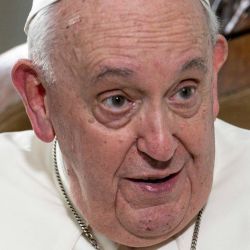


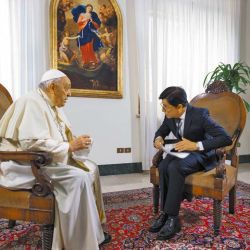
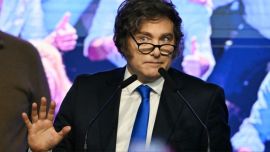

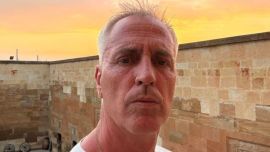

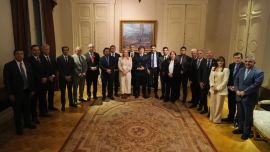
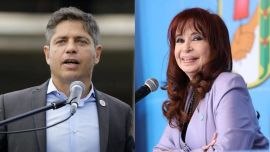
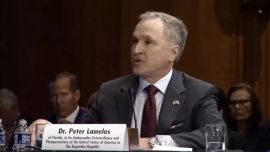







Comments